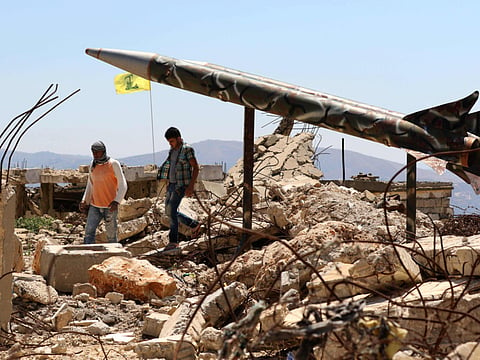Hezbollah popularity deflated 10 years after war
War with Israel in 2006 made the group popular in the Arab world until its sectarian agenda was exposed in the Syria war

Beirut: On the tenth anniversary of the Lebanon War of 2006, many are asking how Hezbollah managed to survive, despite loud Israeli promises of bringing down the Iran-backed military group.
Some hoped that Hezbollah’s military intervention in Syria would achieve what 2006 failed to do: bleed the “party of God” to death and lead to its eventual demise.
On July 25, 2006, 10 years ago on this day, 140 rockets were fired at northern Israel by the Lebanese military group Hezbollah.
On all four corners of the Arab world, people cheered.
Hezbollah leader Hassan Nasrallah was threatening to strike at “Haifa and beyond Haifa”. It was a moment in the sun for Hezbollah, winning the hearts and minds of millions throughout the Arab World. Ten years down the road, much of that affection has disappeared, thanks to the war in Syria.
The Lebanon War of 2006, coined by Hezbollah media as a “divine victory” was launched in response to the abduction of two Israeli soldiers.
Then-Israeli Prime Minister Ehud Olmert pledged to free them and to bomb Hezbollah out of existence.
He failed on both accounts, making Nasrallah the closest thing to an Arab hero that summer.
The party’s massive arsenal was quickly repaired, thanks to immediate assistance from Iran and Syria and, according to the Israelis, Hezbollah emerged from that war stronger than before.
Just like Golda Meir back in 1973, the fact that Israel did not win the war was a disgrace for the Israeli premiership, forcing Olmert out of office in disgrace.
The Lebanon War lasted for 34 days and led to the killing of 250-500 Hezbollah fighters, in addition to 121 Israeli troops and approximately 2,000 Lebanese civilians.
Two soldiers Olmert had promised to restore alive did return to Israel, only in wooden caskets, during a prisoner swap a few years later.
When the war ended, many in the Arab world were hailing Nasrallah as the next Jamal Abdul Nasser.
Syrians and Lebanese closed their shops and interrupted their work day to watch his inflammatory speeches, with sincere affection and respect.
His posters decorated car windows and shop windows, and Nasrallah memorabilia began to sell on the streets of Damascus and Beirut.
That cult worship remains today — but only in Nasrallah strongholds and among his constituency. Recently there have been signs that even his internal support is waning as frustration grows over the loss of men fighting in Syria.
Once viewed as a pan-Lebanese leader, Nasrallah has now positioned himself as a Shiite commander, at daggers end with mainstream Sunni Muslim politicians, especially those who are backed by Saudi Arabia.
This huge slump was due to Nasrallah’s unpopular decision to send his troops to Syria in 2012.
Nasrallah defended his position claiming that if the regime fell in Damascus, Hezbollah’s enemies would devour it, specifically pointing to Saudi Arabia and Israel.
If Islamist militants were allowed to win in Syria they would soon march on Lebanon, he added, saying that it was his party’s mission to “protect” Lebanon from Daesh.
The objectives of Hezbollah’s operations were limited, argued his supporters, only to secure the Syrian-Lebanese borders, the supply of arms from the port cities of Latakia and Tartous to southern Lebanon, and to protect Shiite shrines in Damascus.
The Syrian Opposition cried foul play, cursing Nasrallah’s intervention, and so did Lebanese politicians in the pro-western 14 March Coalition.
They argued that specifically because of Hezbollah’s intervention, Lebanon was suffering one terrorist attack after another, specifically in the southern suburb of Beirut, a Hezbollah stronghold.
Besides lip service, however, nobody in the west has done anything concrete to end the war in Syria and to deprive Hezbollah of its pretext. On the contrary, western countries did nothing to address the root causes of the war, preferring instead to focus on its outcome (ie the Syrian refugee crisis).
Some probably reasoned that Hezbollah would never emerge from the Syrian battlefield alive. They wanted the war to last to drain Hezbollah in a long and costly battle, one that would distract it from its original missions: exporting the Iranian version of Islam and fighting the State of Israel.
The international community, after all, has been trying, with little luck, to disarm Hezbollah through a series of resolutions since 2005. When that failed, Israel tried to do it via war in 2006, also in vain. A third attempt was through Lebanese officialdom, when the government of then-Prime Minister Fouad Al Siniora tried to dismantle Hezbollah’s telecommunications network at Beirut International Airport in May 2008. That confrontation brought Hezbollah troops to the streets of Lebanon, where they swiftly disarmed and over-muscled armed men from 14 March, nearly sparking off another civil war.
The fourth attempt was in 2012, when the world looked the other war as Hezbollah troops crossed the border into Syria. Many believed that Hezbollah was signing its own death warrant, claiming that it would be either locked down into a never ending war, thus bleeding to death, or get torn apart by Islamist militias.
The Israelis saw this as a blessing in disguise, hoping that the war in Syria either destroys Hezbollah, or Syrian President Bashar Al Assad, or Daesh, just as the United States stood by and watched Saddam Hussain and Ayatollah Khomenei fight each other during the eight year Iran-Iraq War. US President Ronald Reagan famously said: “It’s a pity that one side has to win the war; it would be great if both sides lose!”
Sign up for the Daily Briefing
Get the latest news and updates straight to your inbox



